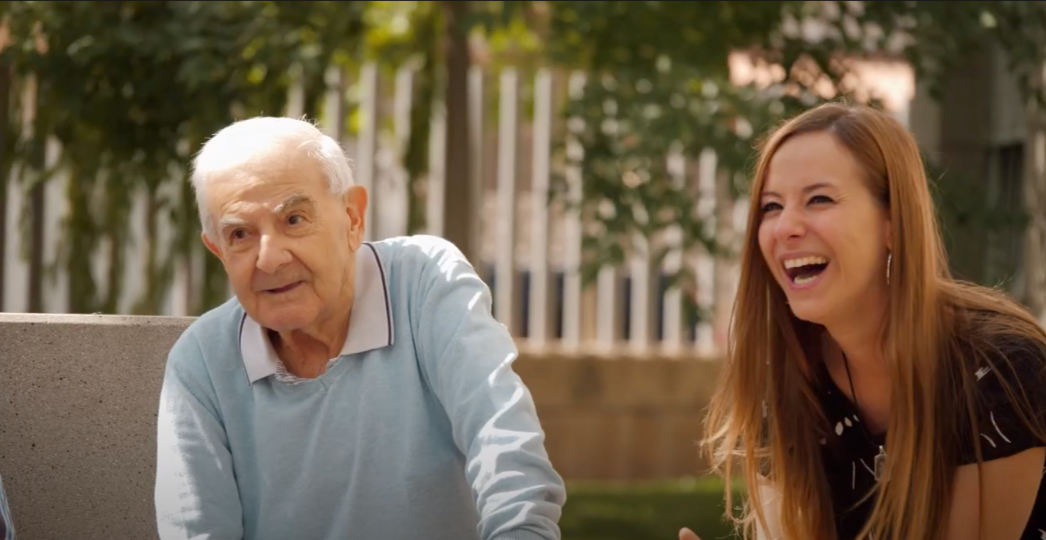
A year and a half ago, in July 2020, I addressed you, the readers of Ageing in Society, to present to you, for the first time, The Eden Alternative, a revolutionary Philosophy of Care, of American origin, which seeks to improve the quality of life of dependent elderly people, in different countries around the world, from the approach of Person-Directed Care (PDC) -no, I did not make a mistake; I did not mean PCA-.
I had met The Eden Alternative during my postdoctoral stay at Harvard University, which took place from 2017 to 2019, and, since then, I set myself the professional and personal goal of importing its principles to Spain -this is what I stated in that post, to which I refer you, if you have not yet read it, so that you can consult it before continuing with the present one-.
A few months later, by Christmas of that same year, I was already announcing -in a new article, which I also urge you to consult- that I had teamed up with the counsellor David Sprowl and the gerontologist Walter Coffey, the ones in charge of taking The Eden Alternative to where it is not yet known, to start walking together towards that goal.
Together with four other Spanish colleagues -Anna Cebrián and Josep de Martí, from Inforesidencias.com, Stephan Biel, from Biel Consulting, and David Ávila, from REDES Cooperativa- I became, in mid 2021, a Certified Eden Associate and Official Ambassador of The Eden Alternative in Spain. Since a few months ago, I am also the first Certified Educator of the training programme of this initiative, which means that, together with my colleagues Stephan and David - who have also achieved this title - I will be in charge, from 2022, of teaching the Eden Associate Certificate courses in Spain.
The Eden Alternative Spain is now a fact. A long year of work and a lot of passion have made it possible that everything is ready, with the invaluable help of Inforesidencias.com, to start, next March 31st, the first Eden Certified Associate course in Spanish. The materials are translated, registrations are open and the desire to get started is sky high. It will be held online, for 6 weeks, every Thursday from 10am to 1:30pm. You can already find us on the web, contact us for an interview or request information in our email, and even follow us on social networks. In addition, on 25 February we will be holding a free webinar to explain the keys to the first training. My dream is coming true!
The news is spreading like wildfire. Word of our arrival is spreading and expectations are awakening, but doubts are also appearing. It makes sense; on this side of the border, hardly anything is known yet about the Eden Alternative. It is only relatively recently that its preachers have been making it known in articles, conferences and interviews.
For example, Josep de Martí wrote, in November 2019, a trilogy of articles for his blog of the same name telling the basics of the history and philosophy of The Eden Alternative. In these, he talked about the three plagues of residential life - loneliness, feelings of futility and boredom - and shared the case of three Edenised residences, located in Georgia, New York and Maryland. Also, in January 2020, he uploaded a short video to the Inforesidencias.com website showing life in an edenised residence in Atlanta. In April 2020, Coffey published an article in the online magazine Dependencia.info describing, again, the principles behind The Eden Alternative. In October of the same year, Sprowl appeared in an interview with Inforesidencias.com doing the same. Both were also interviewed on Stephan Biel's BC Espresso programme in February 2021, where it was already clear that The Eden Alternative "Spain" was in the making. Apart from this, there were the two articles that I had published on this blog in 2020 and some of my conferences, the information that we were all dropping on our personal networks and a link to the website of The Eden Alternative on the ACPGerontology page. This month we had our first choral interview in the podcast "De sentido común" by Cincuentopía and our regional coordinators will also be presenting The Eden Alternative at the III Congreso Nacional Dependencia y Sanidad at the beginning of March -forgive me if I've left anything out-.
From now on, information will be overflowing and anyone will be able to go to our website - or to us - to find out who we are, what we do, why we do it and, perhaps one of the most important questions, who we do it for. Everything is aimed at ensuring that care and support, whatever the environment in which it is provided, is carried out in the most respectful and dignified way possible, at empowering those who give and receive it, at promoting companionship, autonomy and variety in the day-to-day lives of care partners.
We stand up for the latter, i.e. for all those involved in the process of supporting an older person who needs it, including the older person him/herself: family members, friends, professionals, researchers, managers... Even politicians! There are those who think that The Eden Alternative is only for residential homes, because they believe that it is a programme of steps to improve this type of institutions. But it is not a programme, it is a process through which care partners learn, with our help, to identify problems, set goals, plan an intervention, implement it and evaluate its results. This applies to any setting.
It is true that, at its inception, Dr. Bill Thomas, one of the promoters of The Eden Alternative, focused on improving residential life. He wanted to develop a philosophy on which to build authentic communities made up of real homes. We always say that going through this process as a team is more enriching, but the peer group can be made up of the family and friends who form the main support for a dependent older person or a representative percentage of the professional staff working in a day centre. It is not so much a question of what kind of environment the companionship is in, but whether there is a real willingness to make a significant change where it is needed.
The Eden Alternative is not for everyone, even if we only stick to the institutional setting for which it was originally intended. Just as there are studies that show that our philosophy improves the quality of life of care partners in some aged care facilities - see Thomas (1994) or Ransom (2000) - there are also studies that show how others fail to do so.
I recently had the good fortune to get my hands on a copy of the second Doctoral Thesis to be published on The Eden Alternative worldwide. It came to me through the interlibrary loan service of the Complutense University of Madrid, from the University of Alabama at Birmingham. It is Perceived Loneliness, Helplessness, and Boredom of Elderly Residents in Eden Nursing Homes, by Robin Brush Parnell (Troy University), defended in 2005 at the School of Nursing of the same university that sent it to me. The aim of this research was to test for the first time whether the three pests could really be circumvented in edenised nursing homes. To do this, he took as case studies two different residences, which I will call R1 and R2, belonging to the Eden Registry - a list of centres that have publicly committed to our philosophy - and worked with several focus groups to explore their impressions of unwanted loneliness, feelings of uselessness and boredom in their daily life in the residence. Her project revealed that in one of the institutions, R1, the process of edenisation had failed at some point. The three plagues were present in that centre:
- Loneliness was the consequence of the loss of intimacy, as well as the breakdown of contact with family and friends.
- The feeling of uselessness was experienced because of physical deterioration, the lack of power to make day-to-day decisions and the scarcity of opportunities to care for others.
- Boredom was also associated with physical impairment, but especially with doing things alone. It was the least of the problems, however.
The longest-staying residents had adapted to this place through a painful exercise of acceptance, but they did not feel that they were in their own home, as was the case in R2. What were R1 doing wrong?
I reiterate that The Eden Alternative is not a programme, so there is no magic formula or steps to follow that guarantee that any institution or group of care partners following "the method" will succeed. Each context is different and the particularities of the context make the process unrepeatable and non-transferable. The process of care transformation, as we see it, takes place in three spheres: the physical environment, the organisational structure and the personal sphere. Both R1 and R2 had made the effort to turn their centres into homes, eliminating any semblance of a hospital institution. The staff tried to adopt new attitudes, beliefs and values in line with the spirit of Eden. However, the organisation remained hierarchical, which prevented the personal transformation from being effective and the architectural transformation from being of any use.
Specifically, R1 was not able to follow principle 8, which states: The decision-making process has to include the people who are most affected by those decisions. Empowerment activates decision-making power, autonomy and influence. This may have had a lot to do with the fact that it was a centre belonging to a large nursing home corporation. The management had to do a lot of explaining to superiors and could not afford to empower its workers. On the contrary, they were controlled and repressed if they departed from the roadmap set by the residential chain.
R2, on the other hand, was a private institution where the management had full freedom to lead the transformative process. Here, residents reported being at home, not even feeling at home. Many had come for a period of rehabilitation and had decided to stay voluntarily because they felt better than in their own homes. They saw each other as companions and tried to do things for each other: listening to each other, reading to each other, singing to each other, feeding each other, helping each other with hygiene... They had adopted new roles and routines in a natural way thanks to the freedom they had in terms of decision-making.
Does this mean that an institution belonging to a corporate chain with its own "philosophy" cannot benefit from The Eden Alternative? It may not be in a position to take full advantage of it, because if one of the principles is not adopted during the transformation, it is very difficult to see results. The 10 should govern the transformation of daily life in a centre or in a peer group setting. The Eden Alternative is not a philosophy that can be partially practised.
To find out whether a team is really ready to embrace change in its entirety, The Eden Alternative has "warmth" questionnaires that indicate where an institution or care partner group stands with regard to the cultural change that is aspired to. With these, those interested in stepping forward to put the Eden philosophy into practice can see how long and sumptuous the road to transformation is for them and assess whether they are indeed armed with the courage to start the revolution. Is Spain ready to welcome us?


